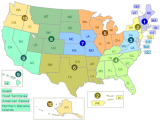Webinars, Meetings and Resources
On this page:
- View the calendar of events for upcoming webinars, meetings, and other important dates.
- See a list of free, IAQ-related on-demand webinar recordings.
- Additional IAQ-related resources.
Calendar of Events
Upcoming events and important dates
Webinar:
Breathing Easier: Protecting Children With Asthma From Wildfire SmokeHear from expert speakers drawn from the EPA’s National Environmental Leadership Award in Asthma Management winners and wildfire smoke preparedness grant program recipients. Speakers shared best practices, community-engagement strategies and innovative approaches to integrate wildfire smoke preparedness into asthma control efforts, protecting children’s respiratory health during wildfire smoke events, and improving asthma health outcomes.
Webinar:
Managing Indoor Air Quality Before and During Wildfire Smoke Events: Smoke-Ready SchoolsThis webinar discussed managing IAQ in wildfire smoke events, using schools as a case study. It provided public health and safety professionals, facility managers, and school administrators with actionable strategies and technical resources to prepare for and respond to wildfire smoke events.
Radon Webinar:
Highlighting the Outreach Successes of the State and Tribal Indoor Radon GranteesEPA presented a SIRG Program overview, and grantees from local, state, Tribal, and non-governmental organizations discussed their unique projects and how this valuable program benefits their communities.
Science Webinar:
ASHRAE Guideline 44-2024: Protecting Building Occupants from Smoke During Wildfire and Prescribed Burn EventsPresented by Greg Nilsson, Sarah Henderson, Abdel Darwich, Mike Gallagher and Randy Cooper.
Schools Webinar:
Reducing Airborne Viruses in Schools: Optimizing Ventilation and Energy EfficiencyWebinar participants learned to:
- Apply ventilation guidance from the EPA and CDC to schools to reduce the spread of airborne disease.
- Provide clean and healthy air in schools while considering energy efficiency.
- Train school facility staff using a new online training.
- Implement IAQ best practices used by an award-winning school district.
Webinar: Going Smoke- and Vape-free in Multiunit Housing!
Webinar participants learned:
- Why smoke- and vape-free multiunit housing is important.
- How smoke- and vape-free policies can eliminate or reduce secondhand tobacco smoke/aerosol exposures in and near multi-unit buildings.
- Tips and resources to implement smoke- and vape-free policies in multiunit housing.
Federal Interagency Committee on Indoor Air Quality (CIAQ)
Air Quality Considerations for Emerging Air Cleaning Technologies
Spanish Webinar:
The impact of lead on indoor air and children's healthThis Webinar was presented entirely in Spanish.
Webinar Recordings
Access these free, on-demand recordings at your convenience!




